Self-employed and neurodivergent: My experience with Access to Work and Brain in Hand
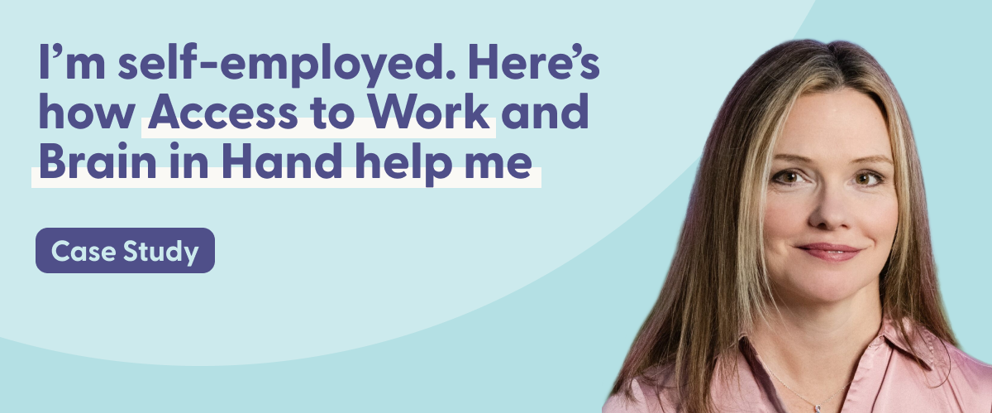
“Around the time that I was starting my own business, I saw a lot of posts on LinkedIn, mainly from big ADHD influencers, saying Access to Work is available and we can help you through the process. I went and looked into it myself and did the application.” says Charlie, sharing her journey with Access to Work while being self-employed.
Meet Charlie, also known as 'Ausome Charlie,' with an 'AU' for autism to highlight their identity as an openly autistic individual. She is a professional speaker on neurodiversity inclusion and has 20 years of experience as an HR analyst.
Through Access to Work, Charlie was recommended Brain in Hand as a tool for psychological support. They share their experiences as an Access to Work applicant, Brain in Hand user, and self-employed professional. Charlie is autistic, has ADHD, and complex PTSD, and highlights how useful support has been in their professional life.
Discovering Access to Work while self-employed
“I discovered that I was autistic in 2018 after struggling to cope with the demands of my HR job for a really long time - chronically overwhelmed, sometimes depressed,” says Charlie. “Eventually I realised because my son was diagnosed, I realised I was autistic as well and I was diagnosed.”
Since then, Charlie continued working as an HR analyst but also engaged in neurodiversity advocacy on the side. Last year, Charlie quit HR to make neurodiversity her main mission and became self-employed. That’s when she decided to apply for Access to Work.
“I’d heard of it before when I’d been to neurodiversity conferences and things like that. But I assumed it was all to do with helping people get a job and get reasonable adjustments at interview, so I knew very little about it,” shares Charlie, highlighting some common misconceptions around Access to Work.
Around the time that Charlie was starting her own business, she came across Access to Work posts on Linkedin. These posts were shared by ADHD influencers and encouraged her to look into Access to Work herself, which led to her making an application.
Getting support from Access to Work
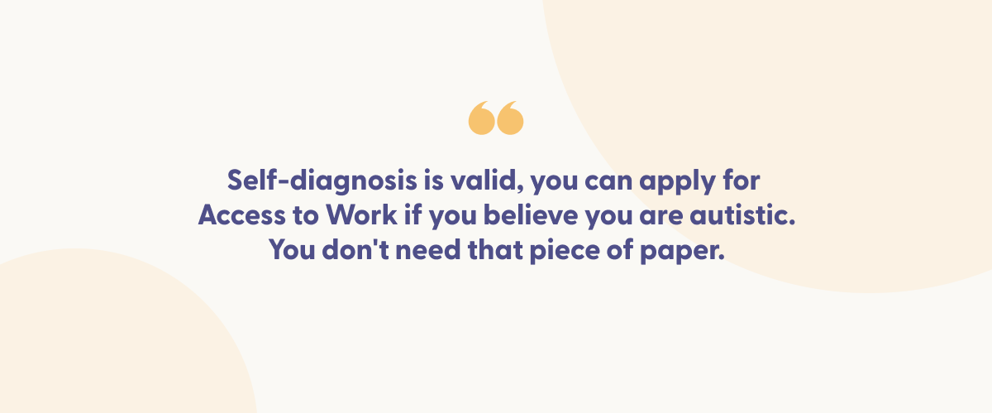
“Four months later, I had a caseworker assigned to me. A couple of weeks after that, I had a Work Needs Assessment with Maximus, and then things moved quite quickly. After that, I got my grant,” says Charlie, sharing their experience with the Access to Work process. Charlie was given access to a range of support, including Brain in Hand, an ADHD strategy coach, and Flown, all of which are helping them in their role.
Becoming a Brain in Hand user
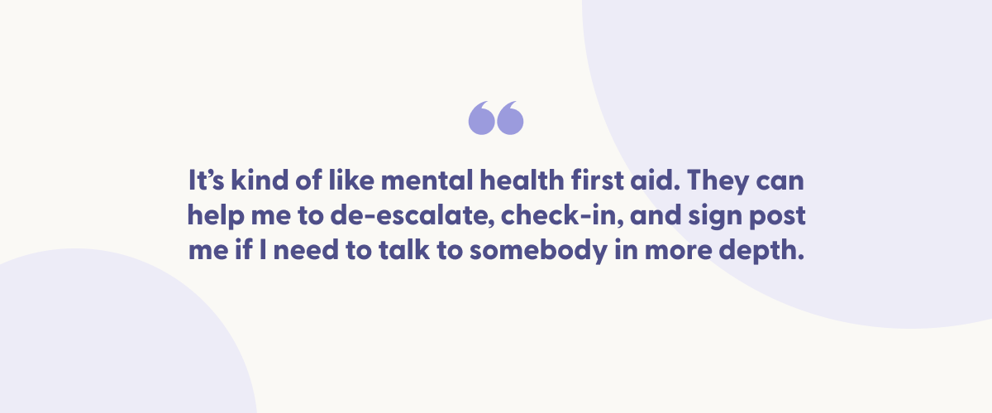
“I discovered Brain in Hand because when I was talking to the assessor at Maximus about things that could help me at work,” shared Charlie. “And I explained that I'm autistic, have ADHD and complex PTSD, and actually it's the latter, the PTSD, that was giving me the most challenges at work.” After talking about how this affected Charlie, the assessor thought it would be useful to have some psychological support that could be used on an ad-hoc basis as and when Charlie needed it.
“I was already on an NHS waiting list for one-to-one support through Worcestershire Healthy Minds but I needed something that would help me de-escalate and calm down if I was emotionally dysregulated or hit a psychological trigger, or even an autistic meltdown,” explains Charlie, sharing their needs and what could help them to get their day back on track. The assessor recommended Brain in Hand, which Charlie shared is ‘brilliant’ and can be used for other things in her life.
How Brain in Hand helps
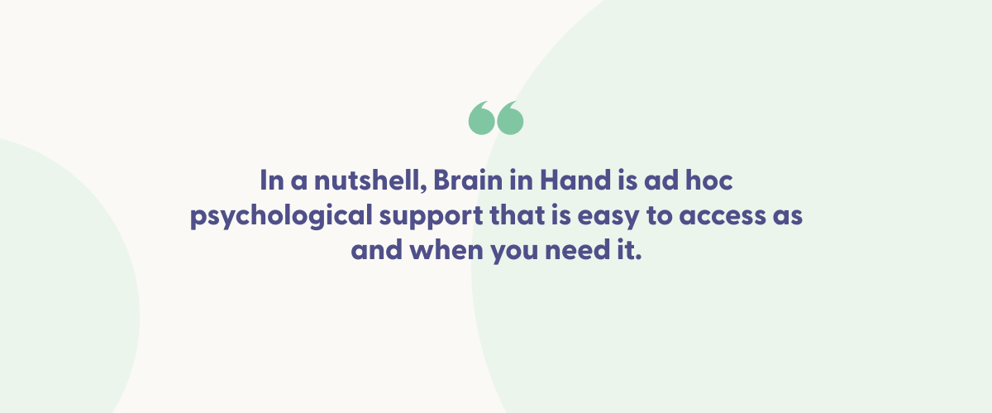
Charlie shared how she benefits from Brain in Hand’s combination of digital and human support. They found Brain in Hand to be useful for:
- Mood management: “It means that, I've got not only the traffic light system, I've got a way of keeping track of my mood and then recognising when things are getting too much for me, and I need to exercise self-care,” explains Charlie, highlighting how Brain in Hand helps her to check in with her emotions and how she is getting on each day.
- Problem-solving: “It also has these solutions packages, that you can build. It comes with them as standard, but I had two sessions of coaching with the lady who works at Brain in Hand. They taught me how to tailor my own solutions packages for the different things that I might encounter, that I struggle with and so I developed some of those” says Charlie, sharing how personalised coaching supported her to make the most out of the digital support tools and solution packages within Brain in Hand.
- On-demand human support: “I've made use of the service where you're struggling and you need to speak to somebody to help you through.” she shares how she uses Brain in Hand’s on-demand human support, which is available 24/7. “It’s kind of like mental health first aid, so they can’t fix all my psychological problems, but they can help me to de-escalate, check-in, sign post me if I need to talk to somebody in more depth, that kind of thing. So, this is something I’ve needed for a long time, I just didn’t know it was available until now.”
How Charlie uses Brain in Hand for work
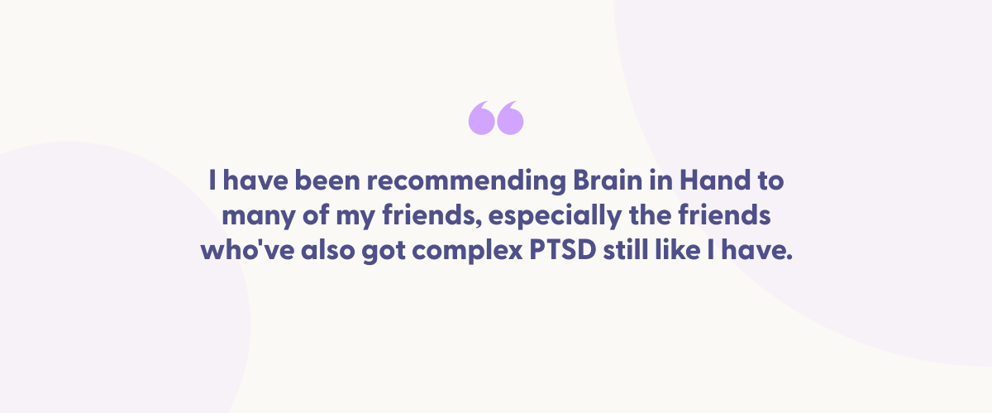
“I mean I use it all the time because it asks me how I am every two to three hours. You can configure that to do it more often or less often. But if I'm getting really overwhelmed, it provokes me to have a think about how I am” shares Charlie, offering a glimpse into how Brain in Hand supports her day-to-day.
“And I'll then take some time to notice whether I'm getting overwhelmed. I have a look at cues, like whether my breaths quickening, whether I'm getting a headache that sort of thing. And then it will prompt me to take time off if I need to or to look at one of those solutions packages, where it talks me through things that I know help.”
How Brain in Hand can support neurodivergent adults
Charlie shares how she views Brain in Hand and what this support looks like to her, as a neurodivergent person. “Brain in Hand for me, in a nutshell, it's ad hoc psychological support that is easy to access as and when you need it. And to me, it's very accessible because I'm autistic and I have ADHD and it's unpredictable when I'm going to need that support. So, the fact that it's there and I can ask for it and it asks me if I need some help if I hit the amber or red traffic lights. So, it really works with my brain.”
They also explain how their Brain in Hand coach was sensitive and understanding of their needs. “When I first started using Brain in Hand and I created my account, I had an email inviting me to book in with a coach for a session to help me set it up, and build some of the solutions packages that are tailored to my needs,” she explains and remembers this to be a difficult session for her personally, because it highlighted how many needs she had.
“That session she handled it really sensitively and she was constantly checking in with me. But it kind of made me think ‘Oh I've actually got quite a lot of needs’. And once it was there, it was well worth doing but then she checked in with me on a second date which I forgot because I've still got ADHD,” shares Charlie, reflecting on the coaching experience. “I forgot all about the appointment and she was really understanding about that as well and rescheduled it without any issues so I'm due a review appointment with her soon, so I look forward to that.”
Charlie finds Brain in Hand to be a useful tool as a neurodivergent adult, but also as someone navigating complex PTSD. “I have been recommending Brain in Hand to many of my friends, especially the friends who've also got complex PTSD still like I have.”
Charlie’s advice for Access to Work
“A lot of people don't realise this, you can apply for Access to Work even if you don't have a diagnosis because it's about the disabling factors and whether there are things that can be done that will help you to thrive at work,” explains Charlie, highlighting how support is still available without a formal diagnosis.
“Self-diagnosis is valid, you can apply for Access to Work if you believe you are autistic, you don't need that piece of paper, and that's really important to know because diagnosis is a privilege that is denied to many people.”
